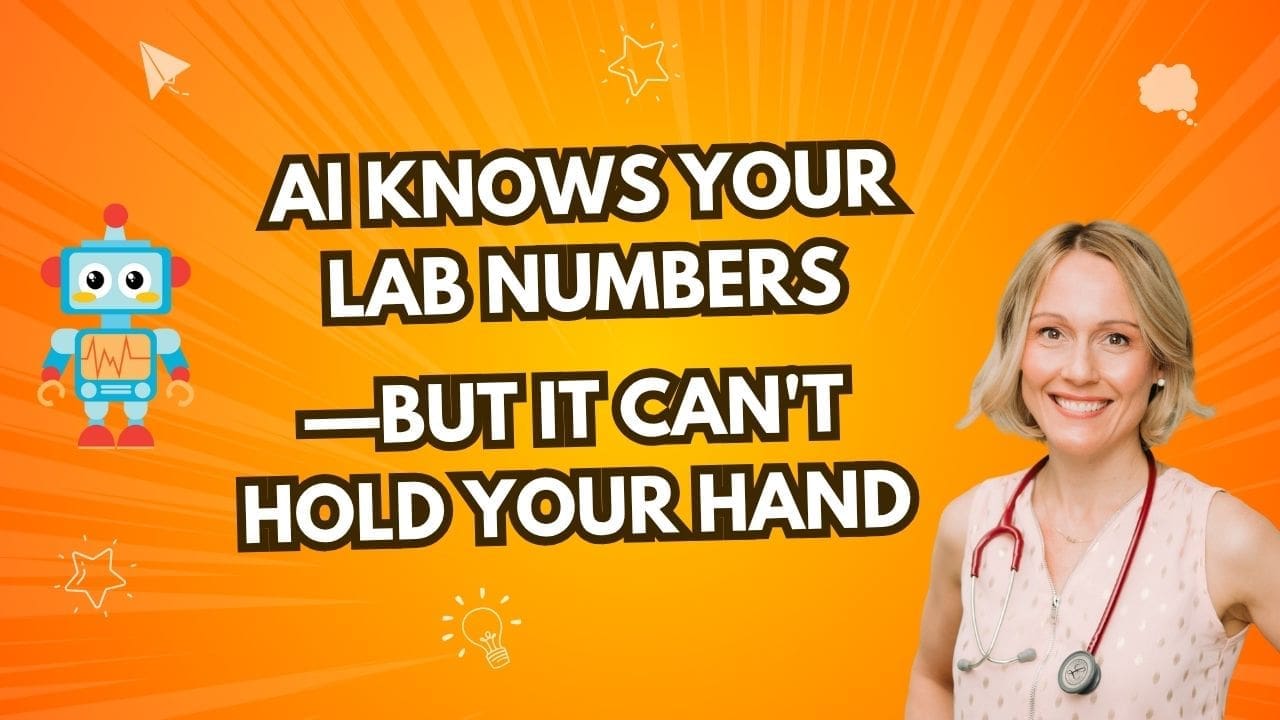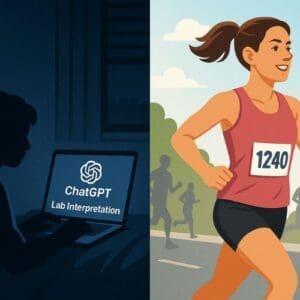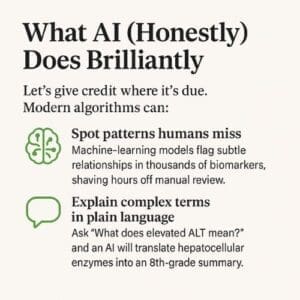Why human care still outruns algorithms for better health outcomes
The Night‑Shift Doctor in Your Pocket
Last week Emma downloaded her latest blood‑work PDF and pasted the results into ChatGPT.
Within seconds the AI produced a five‑paragraph analysis: ferritin on the low side, vitamin D “sub‑optimal,” possible thyroid sluggishness.
Complete with supplement dosages and a sample meal plan.
Impressive, especially at 2 a.m., and Emma printed it out to discuss at her next visit with me.
ChatGPT had done a great job with the numbers she gave it.
Yet, it had no clue she’d run a half‑marathon in June, gone plant‑based in July, and rarely sleeps more than four hours.
Those missing details can flip lab values—and health outcomes—on their head.
If you’ve experimented with AI health tools, you’re not alone.
A July 2025 survey found more than 35% of Americans (sorry I could not find a recent Canadian report) now use AI to manage some part of their health, from symptom checks to meal planning.
Yet 93% say they trust doctors more when stakes are high—an idea worth discussing.
The numbers reveal a simple truth: we adore AI’s instant answers, yet we still lean on a human’s caring energy when our health really matters.
What AI (Honestly) Does Brilliantly
Let’s give credit where it’s due. Modern algorithms can:
Spot patterns humans miss. Machine‑learning models flag subtle relationships in thousands of biomarkers, shaving hours off manual review.
Explain complex terms in plain language. Ask “What does elevated ALT mean?” and an AI will translate hepatocellular enzymes into an 8th‑grade summary.
Work 24/7—no waiting room required. Whether you’re jet‑lagged in Tokyo or nursing a cough at 4 a.m., AI responds instantly.
Stay unbiased by lifestyle quirks. Algorithms don’t judge your weekend pizza or skipped gym session.
Many diagnostic labs we use already run proprietary AI to pre‑interpret panels; our own clinic reviews those algorithmic flags daily.
Used well, AI is like a high‑resolution microscope: it zooms in on details, fast.
But here’s where speed becomes a double-edged sword.
The Caring Gap: Data ≠ Whole Person
The same efficiency that makes AI brilliant also creates blind spots. Three that matter most:
Prompts shape answers. Most patients don’t know the right follow‑up questions. Should I adjust ranges if I run endurance races?
Could night‑shift cortisol spikes distort these numbers? When you’re uploading labs at midnight, uncertain and maybe a little scared, it’s hard to know what context matters most.
Omitting a single crucial fact can swing interpretation entirely.
Nuance lives in conversation. How you tell your story, the hesitation in your voice, the side note about caring for an elderly parent—all of this guides a practitioner toward the real driver of fatigue or inflammation.
The way you mention sleep issues differently when you’re worried versus frustrated gives us clues no text box can capture.
Empathy heals. A 2024 JAMA study on chronic‑pain patients showed that physician empathy outperformed several standard treatments in improving quality‑of‑life scores.
Earlier reviews link empathetic consults to better adherence and satisfaction across conditions.
No matter how many times ChatGPT says, “I’m here for you,” it doesn’t feel your relief—or your fear.
And those emotions—supported or ignored—directly influence immune response, hormone balance, and even gene expression.
Why Empathy Is Medicine
Think back to your last appointment with a provider who really saw you. (I hope you’re thinking about your last visit at Higher Health.)
Maybe they remembered your daughter’s name or noticed you winced when you sat down.
That 30‑second pause to ask, “Tell me more,” activates the vagus nerve, lowers heart rate, and shifts the body toward parasympathetic repair.
Researchers call the effect “therapeutic alliance.” In cancer care, strong alliances correlate with reduced anxiety and higher survival‑quality metrics.
In primary care, every one‑point rise on the Jefferson Empathy Scale predicts higher patient enablement—the confidence to act on advice.
Science keeps finding what humanity always knew: feeling cared for changes physiology.
Naturopathic Doctors: Tech‑Optimized Humans
At Higher Health we adore technology. We upload DUTCH hormone panels, bloodwork, and gut‑microbiome reads into AI dashboards daily.
They colour‑code anomalies, rank patterns, and generate draft treatment ideas. Then the real work begins.
We ask about your 3 p.m. energy crash, not just your fasting glucose.
We connect your ferritin dip to heavier periods that started after a new IUD.
We notice your voice tense when you mention workload, hinting at cortisol rhythm issues no algorithm flagged.
The result is a blended approach: the algorithm accelerates, the doctor individualizes, and you receive a plan that fits both your mitochondria and your Monday schedule.
Have you uploaded labs to an AI tool but still felt uncertain afterward? Do you find yourself Googling symptoms at midnight, getting more confused with each search?
These are signs you might be getting data without the dialogue that makes it meaningful.
When to Call in Human Backup
AI is perfect for background reading or second opinions, but consider partnering with a naturopathic doctor when:
- Symptoms conflict. Your joint pain doesn’t match textbook autoimmune patterns.
- You’re drowning in info. One chatbot says adrenal fatigue, another screams iron overload.
- You need behavior change. Knowing your HbA1c (or insulin) is high isn’t the same as revamping dinner when your kids hate vegetables.
- Stress or emotions are part of the puzzle. (Spoiler: they almost always are.)
An ND weaves labs, lifestyle, and emotion into a single narrative—your narrative—then coaches you through the messy middle where true change happens.
The Future Isn’t Human or Machine—It’s Synergy
Some visionaries dream of a caring robot with perfect bedside manner. Until Elon ships that model, we believe the sweet spot is AI‑augmented empathy: algorithms for pattern‑spotting, humans for meaning‑making.
Already, we use voice‑note apps to transcribe appointments so we can focus on eye contact while AI summarizes action steps.
Soon, ambient sensors may flag stress spikes in real time, prompting a practitioner check‑in. Technology will keep evolving; the need for compassion won’t budge.
A 2025 Annenberg survey shows nearly eight in ten adults go online first for health answers, yet two‑thirds still prefer a human to confirm next steps.
Even as comfort with AI climbs, Pew data remind us 60% of people feel uneasy if their provider relies on AI alone.
The message is clear: people want tech’s brains, but they refuse to lose its heart.
Ready for a Human‑Centered Review of Your Data?
After 14 years helping thousands of women feel their best, our naturopathic doctors would love to support you too.
Book a free, no‑pressure consult—bring your blood work or CGM readouts, and we’ll combine AI‑enhanced insights with genuine conversation to craft a plan that fits your biology and your life.
Click here to reserve your spot. We’ll handle the data—and the caring connection—that turns numbers into real‑world vitality.
Click here and Book Your Free Consultation
Closing Thought
AI has officially joined the health‑care team. It never gets tired, and it delivers biochemical pathways on demand.
But wellness isn’t just a chemistry equation—it’s a relationship.
When algorithms meet empathy, data become decisions, and decisions become healthier, happier humans.
So keep asking ChatGPT questions. Keep exploring wearable dashboards.
Then, when you’re ready for the piece no code can provide, sit down with someone who looks you in the eye and says, “Tell me how you’re really doing.”
That’s where healing starts—and where AI happily hands over the stethoscope.
-Dr. Tara Campbell ND, July 30th 2025.
References:
“More than 1 in 3 Americans are using AI to manage their health, according to new survey,” New York Post, July 24 2025 — Talker Research data showing 35 % already use AI for health tasks and 93 % still trust doctors most. New York Post
Pew Research Center — “60 % of Americans Would Be Uncomfortable With Provider Relying on AI in Their Own Health Care,” Feb 22 2023 — national survey of 11,004 adults on AI reliance and comfort levels. Pew Research Center
Annenberg Public Policy Center — “Many in U.S. Consider AI‑Generated Health Information Useful and Reliable,” July 2025 — finds 79 % look online for symptom answers and gauges trust in AI content. Annenberg Public Policy Center
“Physician Empathy and Chronic Pain Outcomes,” JAMA Network Open, 2024 cohort study — shows empathic care outperforms several standard chronic‑pain treatments. JAMA Network
“The Association of Physician Empathy With Cancer Patient Outcomes: A Meta‑Analysis,” Psycho‑Oncology, 2023 — aggregates evidence linking higher physician empathy to improved cancer‑related outcomes. PubMed





